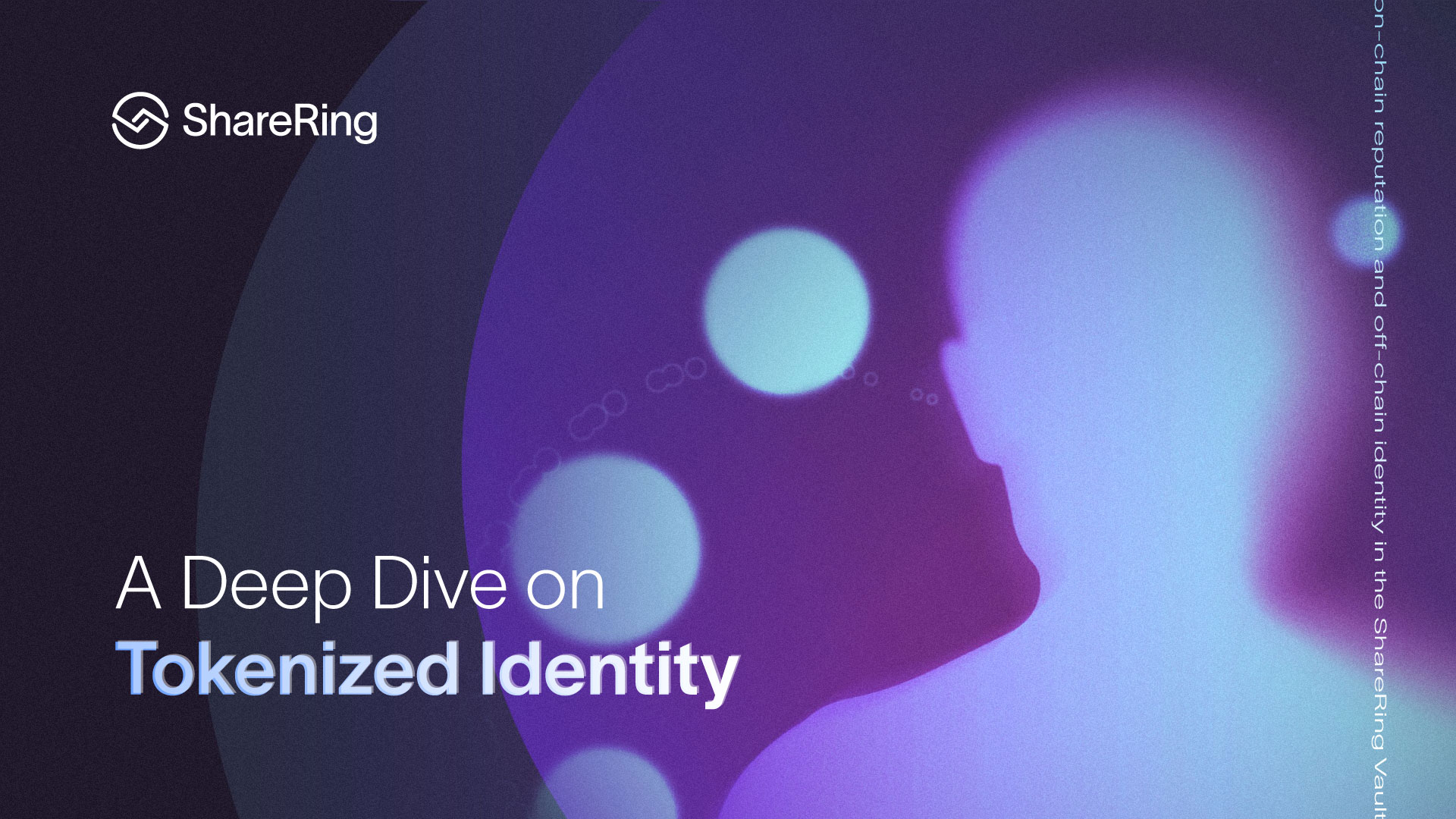An introduction to hybrid digital identities in the ShareRing Vault
Introducing hybrid identity - your on-and-off-chain reputation

Welcome to the end of your web2 life. The internet was fun, it allowed you to interact with all sorts of experiences and people in a truly globalized manner. It was convenient and it was easy, gathered in one central place.
Fun fact. Did you know that the term Web 2.0 was coined by information architecture consultant Darcy DiNucci in 1999 to differentiate the post-dot-com bubble?
Whilst internet experiences have opened up our worlds and provided us with arguably infinite sources of knowledge, it did come at the cost of data. More specifically, our data. Yours. Mine. Your friends, families, and colleagues.
Another statistic before we move to the ‘fun’ part of this article, Meta (formerly Facebook) makes an average $39.63USD of revenue off each of their user's data. Multiply that by the number of users they actively make revenue off of, and the revenue is astronomical. Remember, this is YOUR data being monetized…and you’re not receiving a share in profits.
Our digital footprint and the definition of self-sovereignty

Over the past ~10 years, we’ve explored the internet in a relatively personalized environment - we created accounts with social media platforms to socialize with our friends, we shared personal interests to engage with businesses, and we were shown ads based on our ‘preferences’ and likelihood of interaction. Every digital touchpoint of ours established a part of our digital footprint, and yet we’ve never been in power to control or own ourselves - at least, not in a digital sense. What’s worse is that we’ve exposed ourselves to a flurry of threats, be it our digital security, rights to privacy, and overall safety.
For those of us familiar with digital assets, you already recognize the importance and value of ownership, or more broadly the principle of self-sovereignty.
A quick explainer on what self-sovereignty means: it refers to the practice of individuals directly owning and managing their assets or data, without relying on intermediaries, eg centralized service providers like Google or crypto exchanges.
Here’s an article from Bosch that explains self-sovereignty, and a detailed depiction of the concept in the context of digital identities.
Our digital footprints are essentially blobs of information about ourselves, and our identities are a collection of personal data. Over the last 2-3 years, we have seen a shift in the general internet user’s mindset regarding their data and the importance of owning it, most of which was triggered by businesses mishandling our data and posing us to susceptible scams, and ultimately organizations profiting off of us without our consent.
Consumers are becoming more aware that their data is being mined and monetized against themselves. For example, their data is fed into social media platforms like Meta, which then display advertisements to attract you, and subsequently track your digital interactions. It’s an endless cycle of monetizing from the source - YOU.
Whilst it is nearly impossible for us to stop engaging with businesses (when we engage, we share information), we can proactively minimize the threats associated with these interactions, and maximize the value it bestows on us.

Owning your data is the same as owning your digital assets. You ‘carry’ it with you wherever you go (or whichever dapp & business you interact with).
Drum roll, and cue the Vault.
Vault: tokenized identities to create hybrid on-and-off chain reputation

The Vault is our digital identity protocol built on top of ShareLedger, The Identity Chain for web3. Inside the Vault, individual users can:
- Verify;
- Create;
- Manage; and
- Use
their identity, which is comprised of reputable and trusted information. Your digital identity is an amalgamation of credible information pertaining to yourself - the more trustworthy your data is, the more reputable your digital identity becomes.
Hybrid identity, to simply explain, is the symbiotic relationship between your on and off-chain reputation. The off-chain element is made up of verifiable credentials, whilst the on-chain element is the tokenized representation of your off-chain identity.
If you’re new to the web3 space, we recommend reading this article which explains the concept of tokenization.
In a blockchain ecosystem, the hybrid on-and-off-chain identity model combines the strengths of each model to address the challenges of privacy, scalability, and interoperability. This innovative approach provides a more comprehensive and flexible solution for using digital identities across blockchains and businesses while optimizing performance and creating new user experiences.
Before we conclude, here’s a trivia question - who coined the term Web3, and when and where did it happen? Let us know in our discord server!
The birth of Hybrid Identities at ShareRing

We’ve seen the term decentralized identity many times in web3, and more recently there’s been noticeable noise around on-chain reputation, privacy, and digital identities. The recognition for this technology is beyond web3, proven by the institutional players and traditional web2 businesses that have begun proof of concepts and adoption of digital identities. If you missed it, we announced 2 integration partners, Organic Mobility (JPN), and Profit4Life (Latin America and Spain).
Whilst ShareRing could have simply tokenized identities, we faced the industry-wide challenge of building on public (or permissioned public) blockchains, which are completely transparent and lack user privacy. Tokenized identities alone would also lack the credibility seen in traditional IRL identities. Given digital identities deal with one’s sensitive information, we developed new on-chain identity frameworks to preserve privacy, whilst cryptographically linking it off-chain for credibility.
The future is quite clear from ShareRing’s view, digital identities play a foundational role in the blockchain ecosystem intertwined with traditional businesses and their existing technology. Hybrid Identities are the new building blocks that sit on top of ShareLedger that facilitate on-and-off-chain reputation, and enable the same level of identity verification that happens in-real-life (IRL), but more immersive and user-value orientated.











.jpg)
.jpg)

.jpg)


